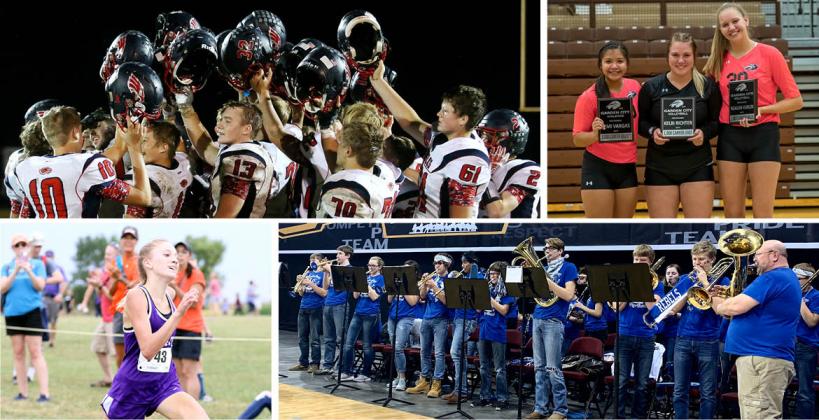Let's find a way to let them play (and debate, and act, and sing)
Extracurricular activities are an essential piece of the educational experience in Kansas
Kansas Governor Laura Kelly announced Wednesday that the start of the 2020-2021 school year will be delayed until at least the week following Labor Day.
With Wednesday’s announcement, those connected to school offered extracurricular activities in Kansas are left worried and confused.
It now appears that all activities will be delayed accordingly, with not even practice allowed to start until school reopens. The Kansas State High School Activities Association has yet to announce a plan, and will not do so this week.
First, let me be clear, I’m not part of the crowd that believes this is some radical Liberal agenda to impact an election cycle. COVID-19 is not equivalent to the flu and it’s not a hoax.
I trust the recommendations of people like KDHE Secretary Dr. Lee Norman and infectious disease expert Dr. Anthony Fauci and I’m convinced Gov. Kelly is just trying to make decisions she believes will protect the citizens of Kansas.
That said, I also remain convinced we should find a way to let the kids participate in the extracurricular activities they love.
All indications are that young people are at a very low risk of hospitalization or death from the virus (https://www.cdc.gov/coronavirus/2019-ncov/hcp/pediatric-hcp.html#burden-...(link is external)).
Many experts recommend a return to school (https://www.nytimes.com/2020/07/15/health/coronavirus-schools-reopening....(link is external)).
A recent study connects masking to spread prevention (https://www.nytimes.com/2020/07/14/health/coronavirus-hair-salon-masks.html(link is external)).
Given these considerations couldn’t mitigation strategies be implemented to massively reduce the spread of the virus in most extracurricular activities?
Extracurricular activities drive classroom performance
As a former high school football coach I can’t emphasize enough the importance of activities to the well-being of those students who are passionate about them. I’ve seen an athlete's motivation to achieve satisfactory progress in the classroom driven, time-and-again, by a desire to earn the opportunity to compete. And I'm certain there are students similarly motivated by participation in music, debate, forensics and other school sponsored extracurricular activities.
My own motivation to achieve at a satisfactory level in the classroom in high school was driven by my desire to play football. Certainly I realize now that attitude was wrong, but it helped me get to college, where I shifted my focus to academics and completed my degree.
I believe there is something encoded in our DNA that makes physical activity and competition essential to the human condition. That may sound dramatic, but look at how many adults seek out competitive recreation opportunities after high school or college. Running, biking, golf, basketball, water sports, weightlifting - most of us participate in one or more of these activities as part of our recreation or fitness routine.
And not just sports, but music, acting, debate. Many adults continue their participation in similar activities for the remainder of their lives and while many from the sports world would not specifically consider extracurricular activities based in the arts to be “physical,” there is definitely a physical component. The ability to modulate one’s voice, to use the entire body to inspire an audience, to expand the lungs to carry a note or deliver impassioned dialogue during the rousing final act of a play all requires muscular, emotional and intellectual proficiency.
Those “non-sport” extracurricular activities are also inherently competitive. No one takes part in a musical or debate with the goal of being mediocre. Artists are driven to hone their craft in the same way that athletes work to achieve the pinnacle of physical performance.
Let’s find a way to let them play
Returning to extracurricular activities appears possible with a mix of masking, hygiene, contact limitations and reduced fan participation.
Students can participate in some activities with masks and others with the appropriate amount of social distance. Hand sanitizer can be made available for students, coaches and officials. Practices can feature reduced contact. Fan access to competitions can be reduced.
Personally, I’m most supportive of a return to play that shifts all sports seasons back according to the new school schedule with some possible reduction in regular season competitions. Flip-flopping spring and fall sports seasons presents too much of a challenge this late in the year and staying as close as possible to the current calendar appears the best option.
In-person learning or not, let’s continue extracurricular activities
I’m a parent of a soon to be eight-year-old girl who I’d love to see return to school for a variety of reasons, but, I believe we should have extracurricular activities even if our return to school is only virtual.
Holding practice for extracurricular activities could serve to provide both students and parents a break in the day, provide the student with much needed physical activity and help them continue to engage academically in an effort to remain eligible for competition.
There are a number of studies that demonstrate the negative health impacts of not returning to school and sports. Here’s one (https://www.wissports.net/news_article/show/1110971?fbclid=IwAR250QYGZ7G...(link is external)).
I get the risk, the need for safety, and the absolute necessity of monitoring the spread of the virus on a daily basis, but can’t we strike a balance that will allow kids a return to the extracurricular activities they love?
Let’s find a way to let them play!
John Baetz is the publisher of Kansas Pregame and the former publisher of the Lincoln Sentinel-Republican and Chapman & Enterprise News-Times. A former high school football coach, he served as defensive coordinator for three different high schools over a 10 year high school coaching career.



